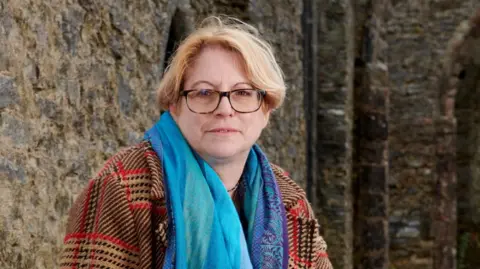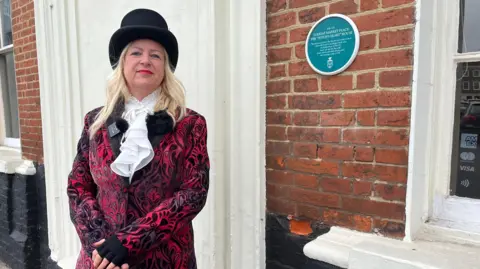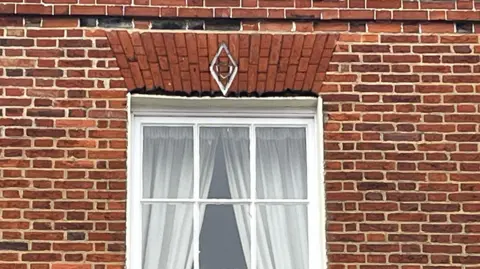Politics driving interest in witches -historian
 Neil Spence
Neil SpenceIncreased interest in the history of witchcraft and witch-hunts is connected to rising political intolerance and polarisation, according to a historian.
The story of women persecuted by Matthew Hopkins, who proclaimed himself "Witchfinder General" in the 17th Century, is being told on ghost trails and heritage plaques in towns across the East of England.
Prof Marion Gibson of Exeter University, an expert in the history of witchcraft, said there had been a spike in interest in the subject, which she connected to contemporary events.
"People have an interest in histories of persecution because we do live in times where accusations are being thrown about," she said.
"Things are very polarised. Some politicians have even started using the word 'witch-hunt' - we hear that quite a lot in the media - and I think that's all pushed up interest in real-life witch-hunts of the past."
Prof Gibson said Hopkins, who was born at Great Wenham, Suffolk, and later died at his home in Manningtree, Essex, was "a fascinating creature".
"From 1645 to 1647, when he died, this quite young man, in his mid-20s, rampaged across Essex, East Anglia and into the Midlands, accusing people of witchcraft," she said.
"By the time he is finished, about 200 people across that region have been executed.
"Hundreds more have been accused and had their lives ruined, and [were] thrown into prison."

Ghost tours featuring stories of witches run in towns and cities including Norwich, Colchester, Cambridge and Bury St Edmunds, Suffolk.
Nicky Proctor is host of The Original King's Lynn Ghost Tour, which covers the Norfolk port's ghost stories, myths and legends in 26 stops.
One the weekly tours, devised during the Covid-19 pandemic lock-down, she typically welcomes between 10-20 people keen to know more about the darker side of the town.
"People say, 'I wasn't going to come because ghosts aren't really my thing' but they they are really glad they did because there is just so much history on the tour as well," she said.
One stop on her tour is the "heart house" on Tuesday Market Place, where the story of Mary Smith is told.

According to Ms Proctor, Mrs Smith was the wife of a glovemaker who was always in awe of the other women who seemed to do so much better than her selling their goods at market.
"One day the devil appeared in front of her, promising that if she renounced God she would be given power by the devil," she said.
"She would be able to curse people. This she did by cursing a sailor who had hit her son. His fingers began to rot and had to be amputated."
Another alleged victim was a widow who Mary accused of stealing a hen, she said.
"The woman had to be taken to taken to her bed through illness and neighbours claimed to have seen her levitate from the bed.
"Mary was condemned as a witch. She was burned at the stake and at the point of death her heart leapt from her chest and to lie under the spot where mysterious forces carved a heart within a diamond upon the wall."
Prof Gibson said: "You have to think about why people are telling these stories, and it may be that this woman and others did think actually think she has the power to curse her neighbours.
"So I think in some cases we're dealing with people who have strong magical beliefs and might have thought had the capacity to curse.
"In other cases, we're probably just dealing with very innocent, ordinary people who have been accused because they are said to have looked at somebody funny, or the community just didn't like them."
Follow Norfolk news on BBC Sounds, Facebook, Instagram and X.
